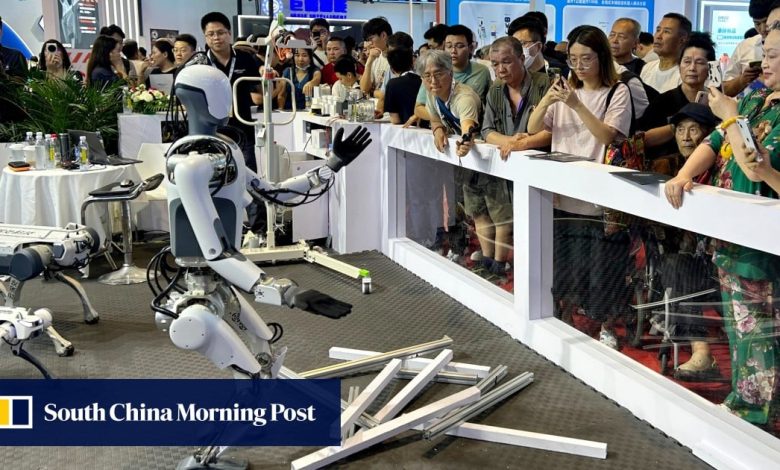China’s own Tesla Optimus? Beijing’s ambitions in humanoid robots in full display at expo

“LLMs have enabled a lot of new concepts and possibilities for robots,” said Hu Jingping, an Agibot employee.
Agibot’s products are geared towards industrial use, such as automated stacking, loading and unloading of materials in factories, as well as greeting customers in shops and offering help before the arrival of a human assistant, according to Hu.
Another exhibitor Astribot – based in the souther tech hub of Shenzhen and backed by venture capital firm MPC, formerly Matrix Partners China – launched a robot assistant called S1 that performed tasks such as writing calligraphy and playing the Chinese dulcimer, a traditional stringed musical instrument.
Start-up Galbot, which counts on-demand food-delivery giant Meituan as an investor, demonstrated how its wheeled robots can pick up and deliver orders to customers, as well as organise goods on shelves for retail chains.
These demonstrations drew swarms of spectators, suggesting growing interest from consumers. Still, technological hurdles and costs continue to hinder humanoid robot manufacturers in China, according to industry experts.

One challenge could be a lack of sufficient data to train LLMs used in humanoid robots, said Li Guangyu, head of data intelligence at the Beijing Embodied AI Robot Innovation Centre (BEAIRIC), a consortium of leading local robotics firms.
“Data is a key restraining factor … LLMs are powerful because there is a sea of internet data [that can be used for training],” Li said. “But there is a lack of data in robot operations.”
To overcome the challenge, Li said BEAIRIC is working to build the world’s largest general-purpose database for robotics AI training.
Other factors limiting the growth prospects of humanoid robots include limited use case and high price, according to Shao Hui, a manager at Juxie Intelligent, a supplier of robot components based in Wuxi, a city in eastern Jiangsu province near Shanghai.
A humanoid robot typically costs hundreds of thousands of yuan, according to Shao. To appeal to families, he suggested that companies lower the prices of their humanoid robots to at least 120,000 yuan (US$15,000).





